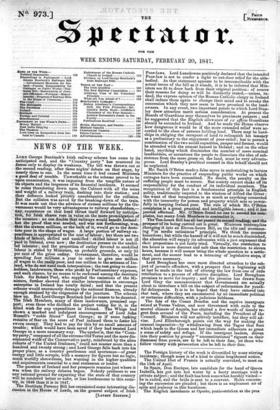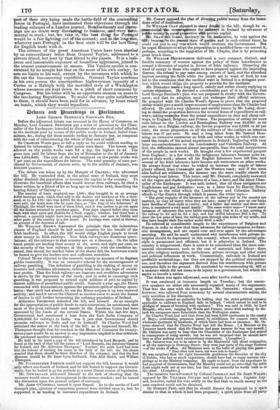The Foreign history of the week is diversified by some
stirring incidents; though none is of a kind to claim lengthened notice. The United Diet of Prussia is actually convoked, to meet on the 11th of April.
In Spain, Don Enrique, late candidate for the hand of Queen Isabella, has got into hot water by a hasty marriage with a private subject ; and the fault has been somewhat harshly visited— he is exiled, and the bride is sent to a convent. Rules concern- ing the succession are pleaded ; but there is an unpleasant air of spite and jealousy in this harshness. The English merchants at Oporto, panic-stricken at the pros
-1)ect of -their city being made the battle-field of the contenting forces in Portugal, have insinuated their objections through the leading columns of a Landon journal. Boinbardments and alarm- ings are no doubt very distracting to business, and -verylktii- mental to stock ; but, .we take it, -the best thing for Porangal would be a fair fighting out of the contest ; and in the lo , whatever puts Portugal in the best state will be the best•thing for English trade with it.
The citizens of the great American Union have been startled by an extraordinary letter from General Taylor, addressed to a private friend, but sent by that friend to the papers. It is a ludi- crous and lamentable exposure of boundless aggression, joined-to the utmost penuriousness in means. The Yankee spoiler is con- strained by no scruple but that on the score of his own outlay; he sets no limits to his raid, except by the meanness with which he - fits out the buccaneering expedition. General Taylor combines in his own person the unscrupulous highwayman rapacity of a Cortes or a Raleigh with the mortified state of a Washington whose resources are kept down to a pitch of short commons by Congress. But his letter will be an opportune sermon on peace to the tax-hating Republicans. To make the war quite satisfactory to them, it should have been paid for in advance, by loans raised on bonds, which they would repudiate.



























